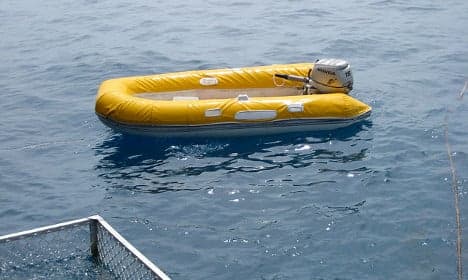Refugees rescued trying to get to UK in inflatable dinghy

Migrants and refugees have been making perilous crossings by boat of the Mediterranean and the Aegean Seas for months, and some are taking their chances with the English Channel.
The French Navy rescued a father, 60, and his two sons, 25 and 35, all suffering from mild hypothermia, from a small inflatable raft off the coast of Dunkirk on Thursday morning, Le Parisien newspaper reported.
The three Iranian men had been living in the Jungle migrant camp near Calais in northern France, before deciding to take their chances in making it to the UK in an inflatable dinghy.
A navy patroller based in Cherbourg spotted the vessel at about 7.00 am when his eye caught sight of an “inflatable vessel of a small size with three migrants on board” a dozen kilometers from shore, said the Dunkirk prosecutor, Eric Fouard
The men were rescued and have been taken into custody by the police in Dunkirk.
“They were in a boat without a motor and only one paddle,” said Fouard.
The prosecutor’s office said: “the migrants said they drove around half an hour away from the Jungle before getting into the water. The trafficker who sold them the boat simply told them, ‘England is straight ahead’.
"But they had absolutely no chance of getting to England,” the prosecutor said.
Attempts to cross the Channel in such a way are rare, with most migrants attempting to make it to England in trucks passing through the tunnel.
But in recent weeks, the Maritime Prefecture of the English Channel and the North Sea have noticed “attempts or plans of crossings to Great Britain by groups of people who take to the sea at night, in inappropriate vessels with too many people on board, without the slightest notion of navigation and unaware of the real danger.”
On February 6th four Iranian migrants were picked up in a small boat off the coast of France.
The Regional Operational Center of Surveillance and Rescue stresses the risks of this crossing: “The straight of Pas-de-Calais is the most frequented maritime route in the world, used daily by more than 400 commercial ships, that’s to say a quarter of global traffic, to which we add fishing boats and pleasure boats.”
Apart from the overabundance of crossing ships, vessels must also be wary of quickly-shifting sand banks, strong currents, and low visibility due to fog.
But with migrants being cleared out of the Calais migrant camp they are looking at new ways into Britain and there have been reports of ports across Normandy seeing a rise in the number of attempted crossings by refugees.
By Katie Warren
Comments
See Also
The French Navy rescued a father, 60, and his two sons, 25 and 35, all suffering from mild hypothermia, from a small inflatable raft off the coast of Dunkirk on Thursday morning, Le Parisien newspaper reported.
The three Iranian men had been living in the Jungle migrant camp near Calais in northern France, before deciding to take their chances in making it to the UK in an inflatable dinghy.
A navy patroller based in Cherbourg spotted the vessel at about 7.00 am when his eye caught sight of an “inflatable vessel of a small size with three migrants on board” a dozen kilometers from shore, said the Dunkirk prosecutor, Eric Fouard
The men were rescued and have been taken into custody by the police in Dunkirk.
“They were in a boat without a motor and only one paddle,” said Fouard.
The prosecutor’s office said: “the migrants said they drove around half an hour away from the Jungle before getting into the water. The trafficker who sold them the boat simply told them, ‘England is straight ahead’.
"But they had absolutely no chance of getting to England,” the prosecutor said.
Attempts to cross the Channel in such a way are rare, with most migrants attempting to make it to England in trucks passing through the tunnel.
But in recent weeks, the Maritime Prefecture of the English Channel and the North Sea have noticed “attempts or plans of crossings to Great Britain by groups of people who take to the sea at night, in inappropriate vessels with too many people on board, without the slightest notion of navigation and unaware of the real danger.”
On February 6th four Iranian migrants were picked up in a small boat off the coast of France.
The Regional Operational Center of Surveillance and Rescue stresses the risks of this crossing: “The straight of Pas-de-Calais is the most frequented maritime route in the world, used daily by more than 400 commercial ships, that’s to say a quarter of global traffic, to which we add fishing boats and pleasure boats.”
Apart from the overabundance of crossing ships, vessels must also be wary of quickly-shifting sand banks, strong currents, and low visibility due to fog.
But with migrants being cleared out of the Calais migrant camp they are looking at new ways into Britain and there have been reports of ports across Normandy seeing a rise in the number of attempted crossings by refugees.
By Katie Warren
Join the conversation in our comments section below. Share your own views and experience and if you have a question or suggestion for our journalists then email us at [email protected].
Please keep comments civil, constructive and on topic – and make sure to read our terms of use before getting involved.
Please log in here to leave a comment.